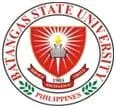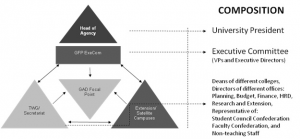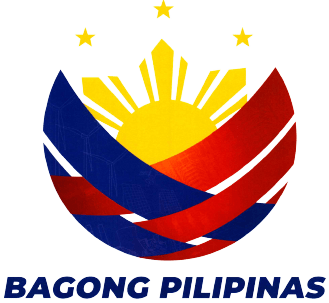

Gender and Development Agenda
(2015-2018)
The Gender and Development Agenda (GAD) supports Batangas State University’s vision, mission and strategic goals, as embodied in its Strategic Plan. The GAD Agenda recognizes the various GAD commitments of the University under various gender-related laws and policies, which include, but not limited to, the Philippine Plan for Gender-Responsive Development Plan (1995-2025), Women in Development and Nation Building Act (Republic Act No. 7192), Anti Sexual Harassment Act of 1995 (Republic Act No. 7877), Anti-Violence Against Women and their Children Act of 2004 (Republic Act No. 9262) and the Magna Carta of Women (Republic Act No. 9710), Gender and Development Accord of Philippine Higher Education Institutions, CHED Memorandum Order No. 1, Series of 2015 (Establishing the Policies and Guidelines on Gender and Development in the Commission on Higher Education and Higher Education Institutions).
The primary thrust of Gender and Development is to develop Batangas State University into a leading gender-responsive higher education institution.
This will be attained by:
- Integrating and advocating gender perspectives in the four-fold functions of higher education, i.e., instruction, research, extension and production, and other University operations through gender-responsive policies, programs and mechanisms; and,
- ensuring that every member of the academic community and its stakeholders are gender-responsive through the enhancement of their capacity to use gender lens in the performance of their functions and champion GAD efforts of the University.
GOAL 1: To mainstream gender and development in the curriculum, research and extension
GOAL 2: To institutionalize gender-responsive mechanisms in the University
GOAL 3: To develop and recognize gender responsive members of the academic community and external stakeholders
GOAL 4: To establish sustainable partnerships with external stakeholders and technical experts and foster cooperation in the planning, development, implementation, monitoring and evaluation of GAD PAPs
GOAL 5: To construct/upgrade facilities which would address gender concerns of stakeholders
CREATION, STRENGTHENING, AND INSTITUTIONALIZATION OF THE GENDER AND DEVELOPMENT (GAD) FOCAL POINT SYSTEM
Pursuant to Section 36 of Republic Act No. 9710, otherwise known as the Magna Carta of Women (MCW), all government departments, including their attached agencies , offices, bureaus, state universities and colleges , government- owned and controlled corporations, local government units and all other government instrumentalities shall adopt gender mainstreaming as a strategy to promote women’s human rights and eliminate gender discrimination in their systems, structures, policies, programs, process and procedures.
Section 37- C of the implementing Rules and Regulations (IRR) of the MCW provides that all concerned government agencies and instrumentalities mentioned above shall establish or strengthen their GFPS or a similar GAD mechanism to catalyze and accelerate gender mainstreaming within the agency.
GAD Focal Point System – is an interesting and interdependent group of people in all government instrumentalities tasked to catalyze and accelerate gender mainstreaming. It is a mechanism established to ensure and advocate for, guide, coordinate, and monitor the development, implementation , review and updating of their GAD plans and GAD-related programs , activities and project (PAPs);
- Guidelines
- Functions of GAD Focal Point
- GFPS Structure for SUCs
- Roles and Responsibilities
- Extension PAPs Supporting GAD
GENERAL GUIDELINES
- The heads of agencies shall issue appropriate directives to institutionalize the creation of the GFPS in their respective agencies;
- Agencies with existing GFPS or similar mechanism shall reconstitute and strengthen said mechanisms based on the provisions of RA 9710 , its IRR and this Memorandum Circular,
- The task and function of the members of the GFPS shall form part of their regular key result areas and work plans and shall given due consideration during performance evaluation;
- Agencies shall develop GAD capacity development programs that support continuing gender education, updating and enhancing skills customized according to the functions of the GFPS, to be integrated in the regular agency Human Resource Development Plan. These capacity development programs may include gender sensitivity, gender analysis, gender- responsive planning and budgeting and gender audit , among others;
- Agencies shall conduct periodic monitoring and evaluation of their GFPS and shall undertake measure to address possible issues hindering the performance of their functions in accordance with the MCW and other GAD-related laws, policies and plans; and
- Funds shall be allocated for programs, activities and projects to support the organization, management and operations of the GFPS , to be charged to the agency’s GAD budget.
FUNCTIONS OF THE GAD FOCAL POINT SYSTEM
The GFPS shall perform the following functions:
- Lead in mainstreaming gender perspective in agency/ department policies, plans and programs. In the process, they shall ensure the assessment of the gender- responsiveness of the systems, structures , policies, programs , processes and procedures of the agency based on the priority needs and concerns of constituencies and employees and the formulation of recommendations including their implementation;
- Assist in the formulation of new polices such as the GAD Code in advancing women’s status;
- Lead in setting up appropriate systems and mechanisms to ensure the generation , processing , review and updating of the sex-disaggregated data or GAD database to serve as basis in performance-based gender responsive planning;
- Coordinate efforts of different campuses, office, units of the agency and advocate for the integration of GAD perspectives in all their systems and processes.
- Spearhead the preparation of the agency annual performance- based GAD Plans, Programs and Budget in response to gender issues of their constituencies and clients and in the context of their agency mandate, and consolidate the same following the format and procedure prescribed by the PCW, DBM and NEDA in the Joint Circular 2012-1. The GFPS shall likewise be responsible for submitting the consolidated GAD Plans and Budgets of the department/agency, and as needed, in responding to PCW’s comments or requests for additional information.
- Lead the monitoring the effective implementation of GAD-related policies and the annual GAD Plans, Programs and Budget;
- Lead the preparation and consolidation of the annual agency GAD Accomplishment Report and other GAD Reports that maybe required under the MCW;
- Strengthen the external link with other agencies or organizations working on women’s rights and gender and development to harmonize and synchronize GAD efforts at various levels of governance;
- Promote and actively pursue the participation of women and gender advocates, other civil society groups and private organizations in the various stages of the development planning cycle, giving special attention to the marginalized sectors; and
- Ensure that all personnel of the agency including the finance officers (e.g. accountant, budget officer , auditors) are capacited on GAD. Along this line, the GFPS will recommend and plan an appropriate capacity development program on gender and development for its employees as part of and implemented under its regular human resource development program.
GFPS STRUCTURE FOR SUCs

ROLES AND RESPONSIBILITIES
- The GFPS Chair person on Head of Agency shall:
- Issue policies or other directives that support GAD mainstreaming in the policies , plans , programs, projects and activities, budget , systems and procedures of the agency including the creation, strengthening , modification or reconstitution of the GFPS; and
- Approve the GAD Plan, Program and Budget of the agency as duly endorsed by the Executive Committee, with the assistance of the Technical Working Group, and ensure its implementation.
- The Executive Committee shall
- Provide direction and give policy advice to the Agency Head to support and strengthen the GFPS and agency’s GAD mainstream activities:
- Direct the identification of GAD Strategies , programs, activities and projects based on the results of the gender analysis and according to the identified priorities of the agency in response to the gender issues faced by its clients and employees ;
- Ensure the timely submission of the agency GAD Plan and Budget, Accomplishment Report and other GAD-related reports to the PCW and to DBM;
- Ensure the effective and efficient implementation of the agency GAD programs, activities and projects and the judicious utilization of the GAD Budget;
- Build and strengthen the partnership of the agency with PCW, GAD experts, advocates, women’s groups and other stakeholders in pursuit of gender mainstreaming;
- Recommend approval of agency GAD Plans and Budgets and GAD ARs; and;
- Recommend awards or recognition to outstanding institutional GAD programs , activities and projects and/ or GAD FP members
- The Technical Working Group (TWG) or Secretariat shall:
- Facilitate the implementation of the gender mainstreaming efforts of the agency through the GAD planning and budgeting process;
- Formulate agency GAD plans, Programs and budget in response to the gender gaps and issues faced by their clients and constituencies, women and men employees, following the conduct of a gender audit, gender analysis, and/or review of sex disaggregated data;
- Assist in the capacity development of and provide technical assistance to the agency , and as needed , to officers in the other offices or units. In this regard, the TWG shall work with the human resource development office on the development and implementation of an appropriate capacity development program on gender equality and women’s empowerment for its employees, and as requested or deemed necessary, for other offices under the Department or Agency, as the case may be;
- Coordinate with the various units of the agency including its regional and attached agencies and ensure their meaningful participation in GAD strategic and annual planning exercises. The TWG of the GFPS of the central agency shall coordinate with the GFPS of its attached agencies, bureaus and regional offices especially on the preparation , consolidation and submission of GAD Plans ang Budgets;
- Lead the conduct of advocacy activities and the development of IEC materials to ensure critical support of agency officials, staff and relevant stakeholders to the activities of the GAD Focal Point System and GAD mainstreaming activities;
- Monitor the implementation of GAD-related programs, activities and projects in their respective offices and suggest corrective measures to improve implementation of GAD PAP’s and GFPS activities;
- Prepare and consolidate agency GAD accomplishment reports; and
- Provide regular updates and recommendations to the head of agency or ExeCom on the activities of the GFPS and the progress of agency GAD mainstreaming activities based on the feedback and reports of the various units of the agency.
EXTENSION PAPs SUPPORTING GENDER AND DEVELOPMENT (GAD)
| Extension PAPs Supporting Gender and Development (GAD) | ||||
| Seminar-Forum on Magna Carta of Women 3rd Flr, AVR Bldg., Gov. Pablo Borobon Main Campus I, Rizal Ave., Batangas City | March 9, 2011(8 hr) | Extension Service Office, Gender and Development Center and different colleges of Main Campus I | 185 Students, Faculty members and Employees | Enhanced education and promoted good governance |
| Forum on Reproductive Health Bill at Amphitheater, CITE Bldg., Main Campus I, Rizal Ave., Batangas City | March 18, 2011 (8 hr) | Extension Service Office, Gender and Development Center and different colleges of Main Campus I | 680 Students, Faculty members, Employees and Women’s Group of different barangays of Batangas City | Enhanced education and promoted good governance |
| Regional Summit on Gender and Development at BatStateU Main I, Rizal Avenue, Batangas City | December 1 and 2, 2011(16 hr) | President's Office, Research and Extension Service Office | 175 Participants from PASUC and HEIs | Enhanced education and promoted good governance |


